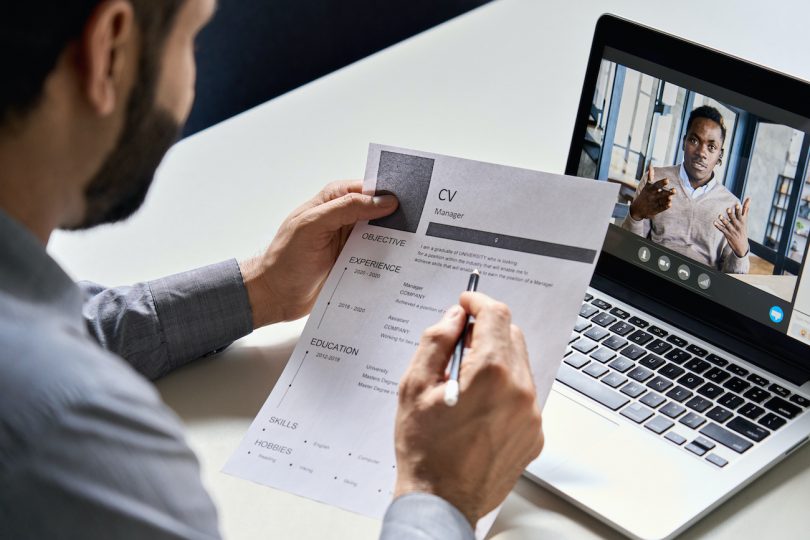Chaloner and PRSA have teamed up to write a series of articles on how candidates and clients can best navigate the recruiting process. Each post of the series chronologically follows the steps of a search process, with direct insights from Chaloner recruiters, clients, placements and candidates who Chaloner has partnered with during the recruiting process. Throughout the series, readers will have the opportunity to learn about how to best partner with a search firm and recruiters.
After nailing a candidate screen call and building rapport with your recruiter(s), the interview stage is the next likely step to take place in the recruiting process.
In this post, we’re talking about the ‘new’ interview norms and nuances that have emerged from today’s virtual hiring world, along with tips for candidates who are getting ready for ‘in-person’ virtual interviews. In response to recent COVID variants and safety precautions, companies have continued to adjust to the need for flexible, remote working arrangements along with pushing back their office reopening plans.
Similarly, the hiring process has pivoted today to take place almost completely on virtual calls. Consider the tips below when you are preparing for your next virtual interview with a prospective employer.
Assess your surroundings.
Is there a baggy sweatshirt sprawled on your couch from the other day when you worked there? Try to make sure the background that appears in your video interview is clear of clutter or private items, no matter where you are. A brightly lit or neutral backdrop is ideal. If you are using a virtual background option from your video conferencing platform, then make sure that option does not take away attention from you. (That Caribbean sunset might be great for a happy hour Zoom call, but probably less so for an interview!)
While working from home might mean distractions from kids and pets, take time to control the distractions you can. In terms of your digital devices, reducing the number of tabs you have open on your computer or silencing notifications on your phone, watch, doorbells and other smart devices can help keep you less susceptible to interruptions during your interview. An hour or more prior to the interview time, test your connection and technology before hopping into your virtual meeting with an interviewer, especially if you are asked to share a presentation in a follow-up interview.
Get in the ‘mental mode’ and be yourself.
Prior to the pandemic, a majority of interviews were conducted in person. In some cases, candidates would perhaps take a longer lunch, leave work early or even take off the entire day just to be mentally, emotionally and physically prepared. A virtual interview should be addressed with the same level of care and formality that you would give to an in-person one. You may not be in the same physical space as your interviewer, but there are plenty of ways to demonstrate your presence beyond what they see on their screen.
“Physical cues communicate your interest and warmth, so be certain to infuse your voice with enthusiasm,” says Tina Dugas, senior associate at Chaloner, “Animate your personality, and don’t forget to smile while talking, which affects the quality of your voice in an energetic way.”
Another important consideration during your preparation is to position your camera and screen so you are parallel to those participating in the interview. For both candidates and interviewers, engaging socially can set the tone of the call. Engaging with a social, warm approach can help ease the awkward nature of virtual interviewing quickly.
Asking “how is your day or week going?” is also great when a candidate is equally as social and interested. Being very relational from the start can help put these conversations into a space that’s safe. Candidates are encouraged to do thorough research on who they’ll be meeting throughout the interview process, which may help them find topics of connection as they meet hiring managers or potential colleagues.
Communicate, communicate, communicate.
With the constant change in and outside of our homes, people are more accustomed to the accidental visitors, appearances or sounds that may come up during a video call. Be sure to communicate what’s happening if something abruptly or unexpectedly happens during your interview.
While in conversation with your interviewer, be a present listener and diligent communicator. As Dugas says, “It’s easy to over-talk, interrupt and speak in incomplete sentences when visual cues are absent. Do your best to make sure your answers, examples and questions are clear and complete if you do glance down because you’re looking at notes.” As a precautionary measure, you can always mute yourself until it’s your turn to speak.
If you and your interviewer are enjoying your conversation, but you find that you’re running close on time, then be mindful of watching the clock. Ask your interviewer: “We’re at the 30 minute mark, I want to be respectful of your time. Do you have a few more minutes to speak or need to hop off?” This will demonstrate your respect for their time and your effective time management skills.
Expect the unexpected.
Sometimes an interview may be spontaneous or not scheduled with great leeway. If you’re comfortable with that scenario and confident that your homework has been done, then go for it. If not, then indicate a desire to be flexible and eager to speak, but suggest an alternative time when you are in a place, mentally and physically, where you can fully engage.
Though most professional interview norms we have learned throughout our careers still apply to the virtual hiring process, we have seen the opportunity for professionals on both sides of the interview to show compassion for what might be going on in another person’s home.
If your home and schedule have been turned upside down by the time your interviewer asks, “Is this still a good time to connect?” then don’t be afraid to let them know about the unexpected changes that have taken place or could take place during your interview. Asking someone if it’s still a good time to connect opens the door for them to share, “Well, actually, I can talk but I want to apologize if my 5-year-old walks in. I’m in charge of childcare today because my wife has COVID.” More often than not, your interviewer is also juggling multiple things at home!
Overall, for both candidates and hiring teams, it is important to bear in mind all of the new and unknown circumstances we face while continuing to adapt and remain flexible in both the virtual and physical world. Acknowledging these interview norms and nuances and working them into your preparation will offer you even more confidence when stepping into this new virtual landscape.








There was a lot on this post that I did not know would be important for an interview. Interviews have changed so much in the past due few months/years due to our world changing in such drastic ways. So it is uber important that we change with it to stay alive. And the tips and tricks on interviews that this post has are very beneficial for this change.